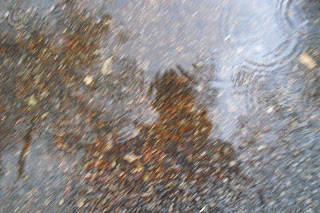The Hunger Games is possibly one of the most popular series in modern day; a trilogy of books, four movies, and a gigantic fandom . . . When I finally got to reading this series a while ago, one of my first reactions was,
Wow; this writing is great! I learned so many writing techniques from it, including:
Narration. Personally, I thought it was what stood out first. Katniss's voice is clear, very distinct, and she totally sounds like a sixteen year old girl. Though Katniss is hardened by a rough life and required to know a lot more than the typical teenager does, she acts her age.One of my writer fears is that as I get older, I'll write young characters who don't act or think like actual people their age do, but Suzanne Collins clearly does not have this problem.
Pacing. Oooh, so you don't
have to describe scenes moment-by-moment. This book had fantastic pacing. Rather than write every single action that happens and every place Katniss walks through, there are some parts where it's just briefly mentioned. Like saying "they went to the cafeteria" instead of "they walked out of the room, through the hall, into and down the elevator, went through another hall, and entered the cafeteria two doors down." There was no fluff in the writing. The pacing flowed smoothly, seamlessly, carrying the reader from event to dialogue to action, and so on.
Humor. The funny moments in this book really balance out the more grisly events of the novel. Some sources of humor in this somewhat gloomy setting were Katniss's sarcasm, Haymitch Abernathy, Effie Trinket, and some scenes where Haymitch and Effie collide. The presence of these humorous characters act as sort of an alleviation in what could otherwise be a very tight, sinister setting, and Katniss's wit is just really balanced well with other parts of her personality.
The training scenes. In the story, Katniss, Peeta, and all the other tributes have to go through extensive training. These scenes are shown in the book, but they're not boring or too long or anything. The length is reasonable enough to show that a lot of time is invested in preparation, but not enough to make it seem like time is dragging on and on. Plus, the training scenes don't just push the plot forward, but there's some foreshadowing, added conflict, and character development. The scenes are really utilized to their fullest extent without crowding them up with information.
Killing is not justified or romanticized. This was one of the reasons I stayed away from the series until I was older. I feared that the story was beefed up with characters who kill and then justify it with "them or me" without any qualms, but that's not the way it is. Katniss does take lives in the story, but one was an accident, and one was a mercy killing. She understands that the killings in the Hunger Games are murders, she is horrified and repulsed by the death she sees, and she's haunted by it throughout the whole series. In a story like this, death would be inevitable, but I sort of admire how Collins carefully handled the subject in this first book.
Wounds and consequences were realistic. One of the things that's fantastic about novels is that there's more room to add and go into details. In
The Hunger Games, details are definitely given attention. The arena is a synthesized forest, so Katniss has to constantly hunt for food and fresh water. The authenticity of the hunting/cooking details are also impressive, going beyond mentioning only shooting arrows and cooking over a fire. There's also a part where Katniss is very, very close to a large explosion, and she suffers the consequence of partial deafness. This kind of thing isn't always touched on in TV serieses or movies, so I found the realistic consequence almost refreshing.
So there are the major writing things I picked up while I was reading. What about you? What's your favorite writer thing about
The Hunger Games?













